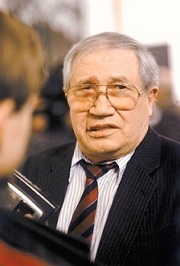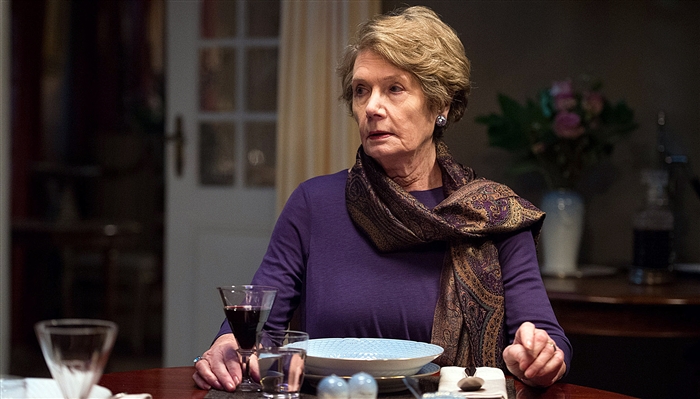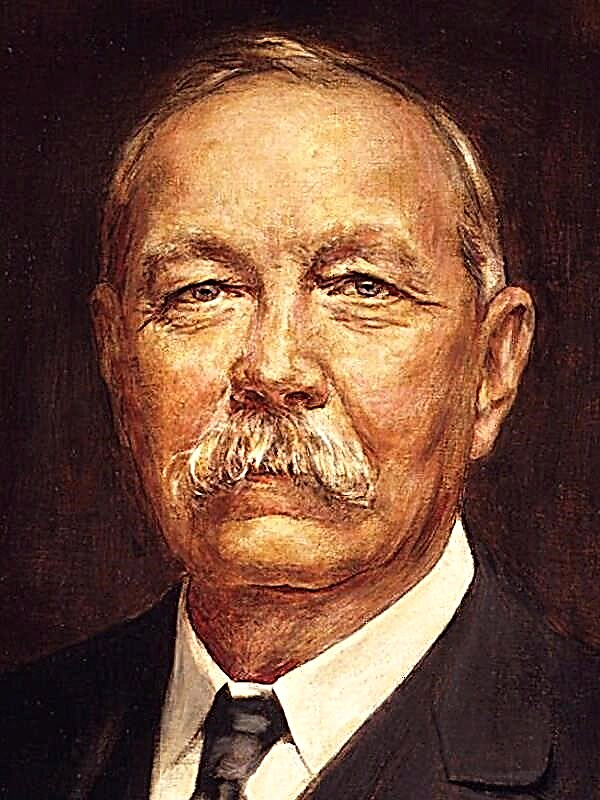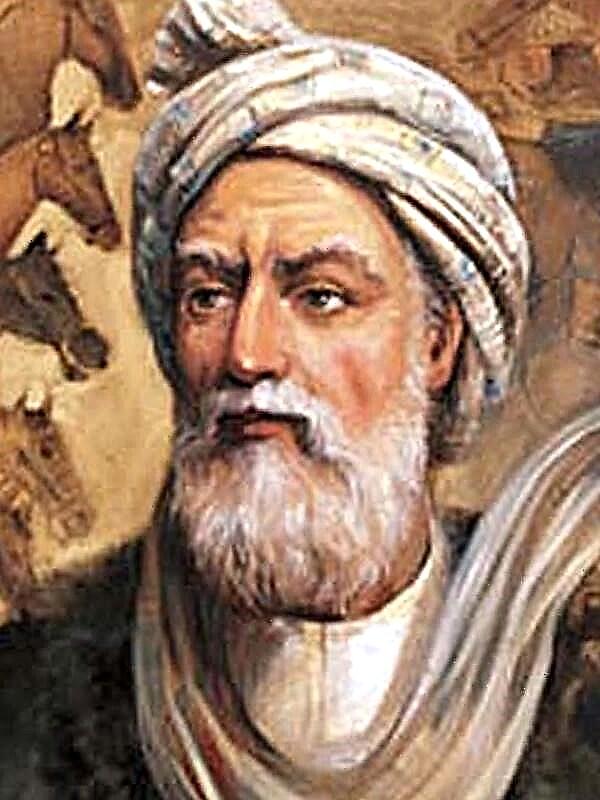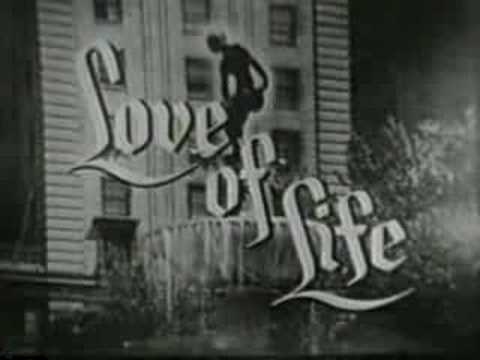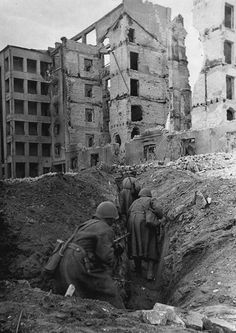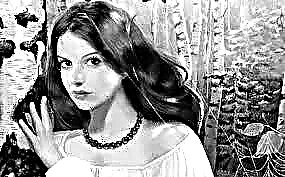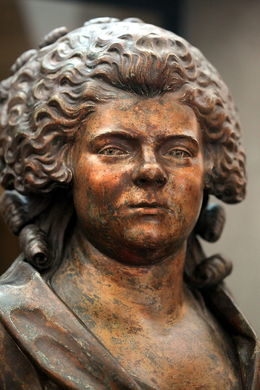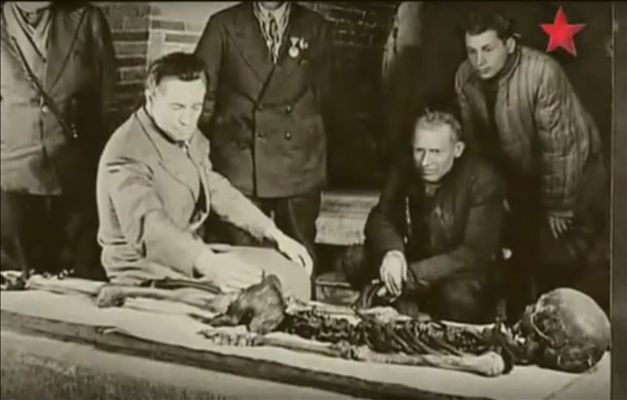There were many princes in the world, omnipotent and cruel, but all descended from the descendant of the old family, Prince Kiyomori Tayra, a monk ruler from the Rokuhara estate - there is such a rumor about his deeds, about his rule that truly cannot be described in words. For six generations, the houses of Tyra have served as rulers in various lands, but none of them has been honored to appear in court. Kiyomori's father, Tyra Tadamori, became famous for erecting the Temple of Longevity, in which he placed a thousand and one Buddha statues, and this temple was so much liked by everyone that the sovereign granted Tadamori the right to appear in the court. As soon as Tadamori was about to introduce himself to the emperor, the court envious persons decided to attack the uninvited guest. Tadamori, having learned about this, took his sword to the palace, which terrified the adversaries, although the palace should have been unarmed. When all the guests gathered, he slowly drew his sword, put it to his cheek and froze motionless - in the light of the lamps the blade burned like ice, and the view from Tadamori was so formidable that no one dared to attack him. But complaints fell upon him, all the courtiers expressed their indignation to the sovereign, and he already intended to close the palace gates for Tyra, but then Tadamori drew his sword and respectfully handed it to the sovereign: in a black lacquered scabbard lay a wooden sword, covered with silver foil. The sovereign laughed and praised For his foresight and cunning. Tadamori was also distinguished on the path of poetry.
The son of Tadamori, Kiyomori, gloriously fought for the sovereign and punished the rebels, he received court posts and finally the rank of chief minister and the right to enter the forbidden imperial city in a carriage drawn by an ox. The law stated that the chief minister is the emperor’s mentor, an example to the whole state, he rules the country. They say that all this happened thanks to the grace of the god Kumano. Kiyomori once rode the sea on a pilgrimage, and suddenly a huge sea pike jumped into his boat itself. One monk said that this is a sign of the god Kumano and that this fish should be cooked and eaten, which was done, since then Kiyomori has smiled at happiness in everything. He gained unprecedented power, and all because the ruler-monk Kiyomori Taira gathered three hundred youths and took to his service. They cut their hair in a circle, made a hairstyle, and dressed in red jackets. Day and night, they wandered the streets and sought out sedition in the city, they would just see or hear that someone was vilifying the house of Tyra, immediately with a cry of kaburo they would rush at the man and drag him to the Rokuhara manor. Kaburo walked everywhere without demand, before them even the horses themselves turned off the road.
The entire Tyra clan was prosperous. It seemed that those who did not belong to the Tyra clan were not worthy of being called people. Kiyomori's daughters also prospered, one was the spouse of the emperor, the other was the spouse of the regent, the teacher of the baby emperor. How many estates, lands, bright dresses, servants and Chelyadins they had! Of the sixty-six Japanese provinces, they owned thirty. Tayra-Rokuhara Manor surpassed any imperial court in luxury and splendor. Gold, jasper, satin, precious stones, noble horses, decorated carriages, always lively and crowded.
On the day of the maturity of Emperor Takakur, when he granted a visit to the house of his august parents, several strange incidents occurred: at the height of prayers from Mount Muzhi three pigeons flew down and started a fight in the branches of an orange tree and pecked each other to death. “Troubles are coming,” said knowledgeable people. And in the huge cryptomeria, in the hollow of which the altar was built, lightning struck, and a fire broke out. And all because everything in the world happened at the discretion of the house of Tyra, and the gods opposed this. The monks of the holy mountain Hiei rebelled against Tyra, as Tyra inflicted undeserved offenses on them. The emperor once said: "Three things are beyond my control - the waters of the Kamo River, dices and monks of Mount Hiei." The monks gathered a lot of Chernets, novices and ministers from Shinto churches and rushed to the imperial palace. Two troops were sent to meet them - Tyra and Yoshifus Minamoto. Minamoto behaved wisely and managed to inform the rebellious monks, he was a famous warrior and a wonderful poet. Then the monks rushed to the army of Tyra, and many died under their sacrilegious arrows. Moans and cries rose to the sky itself, throwing the arks, the monks ran back.
The abbot of the monastery of Mount Hiei, a venerable holy man, was expelled from the capital far to the edge of Izu. The oracle of the mountain announced through the mouth of one lad that he would leave these places if such an evil deed was accomplished: no one in history had dared to encroach on the rector of Mount Hiei. Then the monks rushed to the capital and forcefully repulsed the abbot. The monk ruler Kiyomori Tayra became furious, and many were captured and killed by his order, the servants of the sovereign, noble dignitaries, But this seemed to him not enough, he put on a black brocade caftan, encircling the black shell, picked up the famous halberd. This halberd went to him in an unusual way. Once he spent the night in the temple, and he dreamed that the goddess handed him a short halberd. But it was not a dream: waking up, he saw that next to him lay a halberd. With this halberd, he went to his rational son Sigemori, and said that the sovereign had plotted, and therefore he should be imprisoned in a remote estate. But Sigemori replied that, apparently, he was coming to an end, Kiyomori, with a happy fate, since he intended to sow confusion in the country of Japan, having forgotten about the Buddha’s covenants and the Five Constantities - philanthropy, duty, rituals, wisdom and loyalty. He urged him to change his armor to a suit of a monk's suit. Sigemori was afraid to break his duty in relation to the monarch and filial duty and therefore asked his father to chop off his head. And Kiyomori retreated, and the emperor said that Sigemori was not the first time to reveal the greatness of the soul. But many dignitaries were exiled to the island of Demons and other terrible places. Other sovereign princes began to resent the omnipotence and cruelty of Tyra. All the dignities and posts at court were received only by dignitaries of this kind, and other dignitaries, soldiers had only one way - to the monks, and their chelyadinets, servants and households were waiting for an unenviable fate. Many faithful servants of the sovereign perished, anger relentlessly tormented his soul. The emperor was gloomy. And the monk ruler Kiyomori was suspicious of the sovereign. And so the daughter of Kiyomori, the wife of Emperor Takakura, was supposed to be freed from the burden, but she was seriously ill, and the birth was difficult. Everyone in the palace prayed in fear, Kiyomori released the exiles and offered prayers, but nothing helped, his daughter only waned. Then the emperor Go-Shirakawa came to the rescue, he began to cast spells in front of the curtain, behind which the empress lay, and immediately her torment ended and a boy prince was born. And the monk ruler Kiyomori, who was in confusion, rejoiced, although the appearance of the prince was accompanied by bad omens.
A terrible tornado flew into the capital in the fifth moon. Sweeping away everything in its path, the tornado overturned heavy gates, beams, crossbars, pillars mixed up in the air. The sovereign realized that this disaster happened for a reason, and ordered the monks to ask the oracle, and he announced: "The country is in danger, the teachings of Buddha will go down, the power of the sovereigns will decline, and there will be endless bloody trouble."
Sigemori went on a pilgrimage, having heard a gloomy prediction, and rode a horse into the river on his horse, and his white clothes darkened from the water and became like mourning. Soon he fell ill and, having accepted the monastic rank, passed away, mourned by all loved ones. Many grieved over his early death: "Our little Japan is too close a container for such a high spirit," and they also said that he was the only one who could mitigate the brutality of Kiyomori Taira and only thanks to him the country was at rest. What troubles will begin? What will happen? Before his death, Sigemori, having seen a prophetic dream about the death of Tyra’s house, handed over the mourning sword to his brother Coramori and ordered him to be dressed at the Kiyomori funeral because he foresaw the death of a kind.
After the death of Sigemori Kiyomori, being angry, he decided to further strengthen his already infinite power. He at once deprived the posts of the noblest noblemen of the state, ordering them to remain in their estates without leaving any place, and to send others to exile. One of them, a former chief minister, a skilled musician and lover of the graceful, was exiled to the far end of Tos, but he decided that for a sophisticated man, does it really matter where to admire the moon, and he was not very upset. The villagers, although they listened to his play and singing, could not appreciate their perfection, but the god of the local temple listened to him, and when he played “The Fragrant Breeze”, a fragrance floated in the air, and when he sang the hymn “I beg you, forgive me sin. .. ”, then the walls of the temple shuddered.
In the end, the Emperor Go-Shirakawa was sent into exile, which plunged his son Emperor Takakuru in great sorrow. Then he was removed from the throne and elevated to the throne of the grandson of Kiyomori, a young prince. So Kiyomori became the emperor’s grandfather, his estate became even more luxurious, and his samurai dressed up in even more magnificent dresses.
At that time, the second son of the sovereign Go-Shirakawa, Motihito, quietly and imperceptibly lived in the capital, he was an excellent calligrapher and had many talents and was worthy to take the throne. He composed poetry, played the flute, and his life passed in despondent solitude. Yorimasa Minamoto, an important courtier who took the priesthood, visited him and began to persuade him to rebel, overthrow the house of Tyra and take the throne, and many Minasso vassals and supporters would join him. In addition, one forecaster read Motihito on his forehead that he was destined to sit on the throne. Then Prince Motihito appealed to Minamoto's supporters to unite, but Kiyomori talked about it, and the prince had to urgently flee from the capital in a women's dress to the monks of the monastery of Miidera. The monks did not know what to do: Tyra was very strong, for twenty years all over the country the grass and trees obediently bent before them, and the Minamoto star, meanwhile, had faded. They decided to gather all their strength and strike at the Rokukhar estate, but first they strengthened their monastery, built palisades, erected walls, and dug ditches. There were more than ten thousand soldiers in Rokuhara, and no more than a thousand monks. The monks of the Holy Mountain refused to follow the prince. Then the prince with a thousand of his associates went to the city of Naru, and the soldiers of Tyra set off after them. On the bridge over the river, which broke off under the weight of the horsemen, the first battle broke out between Tyra and Minamoto. Many Tyra warriors died in the waves of the river, but the people of Minamoto drowned in the stormy spring waves, both foot and horsemen. In multi-colored shells - red, scarlet, light green - they either plunged, then floated, then disappeared again under the water, like red maple leaves, when the breath of an autumn storm rips them off and carries them to the river, the Prince and Yorimasa Minamoto died in battle , struck by the arrows of the mighty warriors of Tyra. In addition, Tyra decided to teach the monks Miidera’s monks a lesson and brutally dealt with them, and burned the monastery. People said that Tyr's atrocities reached the limit, they counted how many nobles, courtiers, monks he exiled, ruined. Moreover, he moved the capital to a new place, which brought untold suffering to people, because the old capital was a miracle how good. But there was no one to argue with Kiyomori: after all, the new sovereign was only three years old. The old capital has already been abandoned, everything has fallen into disrepair, it has become overgrown with grass, has died out, and life has not yet been arranged in a new one ... They began to build a new palace, and residents rushed to new places in Fukuhara, famous for the beauty of moonlit nights.
Bad dreams were dreamed in the new Kiyomori palace: he saw mountains of skulls under the windows of the palace, and, as luck would have it, the short halberd presented by the goddess disappeared without a trace, apparently, the greatness of Tyra is nearing its end. Meanwhile, Yoritomo Minamoto, who was in exile, began to gather strength. Supporters of Minamoto said that in the house of Tyra, only the late Shigemori was strong, noble, and vast in mind. Now they do not find anyone who is worthy to rule the country. You can not waste time in vain, you need to rebel against Tyr. No wonder it is said: "By rejecting the gifts of Heaven, you incur their wrath." Yoritomo Minamoto hesitated and hesitated: he was afraid of a terrible fate in case of defeat. But the disgraced sovereign Go-Shirakawa supported his undertakings with the highest decree, which commanded him to start the battle with Tyra. Yoritomo placed the decree in a brocade case, hung it on the neck and did not part with it even in battles.
In the new capital, Fukuhara, Taira prepared for battle with Minamoto. Cavaliers said goodbye to the ladies, who regretted their departure, the couple exchanged elegant poems. Commander Tyra - Koremori, son of Shigemori, turned twenty-three years old. The painter’s brush is powerless to convey the beauty of his appearance and the magnificence of his armor! His horse was gray in apples. He rode in a varnished black saddle - golden glitter over black varnish. Behind him, Tyr's army - helmets, shells, bows and arrows, swords, saddles and horse harness - everything sparkled and sparkled. It was a truly magnificent sight. The soldiers, leaving the capital, made three vows: to forget their home, to forget about their wife and children, to forget about their own lives.
Behind Yoritomo stood several hundred thousand warriors from the Eight Eastern Lands. The inhabitants of the plain of the Fuji River fled in fear, leaving their homes. Alarmed birds flew from their homes. The Minamoto warriors issued a threefold war cry, so that the earth and sky shuddered. And the warriors of Tyra fled in fear, so that not a single person remained in their camp.
Yoritomo said: "There is no merit in this victory, this great bodhisattva Hachiman sent us this victory."
Kiyomori Taira was furious when Coramory returned to the new capital. It was decided not to return to a new place, since Fukuhara did not bring Tyra happiness. Now everyone in a mad rush settled old, ruined houses. Tyra, although afraid of the monks of the Holy Mountain, intended to burn the old monasteries of the holy city of Nara, nurseries of rebellion. The holy temples were defeated, the golden statues of the Buddhas were thrown into dust. Human souls plunged into grief for a long time! Many monks accepted death by fire.
The military turmoil in the eastern lands did not abate, monasteries and temples in the old capital died, the former emperor Takakura died, and with the smoke of the funeral pyre he ascended to heaven like a spring fog. The emperor was especially fond of crimson autumn leaves and was ready to admire a beautiful sight for days on end. He was a wise ruler who appeared in our dying days. But, alas, the human world is so arranged. Meanwhile, the offspring of the house of Minamoto, a young Yoshikata, appeared. He intended to put an end to the rule of Tyra. Soon, due to Tyra's atrocities, the entire east and north separated from him. Tyra ordered all his associates to come to restrain the east and north. But then the monk ruler Kiyomori Tyra fell seriously ill, a terrible fever overwhelmed him; when it was watered, it hissed and evaporated. Those jets that did not touch the body were blazing with fire, all was obscured by dark smoke, the flame, spinning, rose to the sky. The wife could barely approach Kiyomori, overcoming the intolerable heat emanating from him. Finally, he died and embarked on the last journey to the Mountain of Death and to the River of Three Roads, to the underworld, from where there is no return.Kiyomori was powerful and powerful, but he also turned into dust overnight.
Sovereign Go-Shirakawa returned to the capital, began to restore the temples and monasteries of the city of Nara. At this time, Minamoto and his minions approached the capital district with battles. It was decided to send them across the Tyra troops. They managed to defeat the Minamoto advance detachments, but it became clear that the eternal happiness of Tyra had betrayed them. In the middle of the night, a terrible whirlwind came in, rain poured in, a thunderous voice came from behind the clouds: “Minions of Tyra’s villain, drop your weapon. There will be no victory for you! ” But the Taira warriors persisted. Meanwhile, the forces of Yoritomo and Yoshinaka united, and Minamoto became twice as strong. But the clouds of samurai hastened to Tyra from all sides, and more than a hundred thousand were gathered. The troops of Tyra and Minamoto met not on a wide plain, but Minamoto, inferior to the number of Tyra, cunningly lured them into the mountains. Both troops became face to face. The sun was setting, and Minamoto pushed the enemy back to the vast abyss of Kurikar. The voices of forty thousand horsemen roared, and the mountains collapsed together from their cry. Tyra were trapped, seventy thousand horsemen collapsed into the abyss, and all died.
But Tyra managed to gather a new army and, giving respite to people and horses, became a combat camp in the town of Sinohara, in the north. They fought for a long time with the army of Minamoto, many soldiers from both sides fell in battle, but finally Minamoto with great difficulty gained the upper hand, and Tyra fled from the battlefield. Only one stately hero continued to fight and after a fierce battle with the heroes Minamoto lost and was killed. It turned out that the faithful elder Sanemori, a holy man, painted his head black and went out to fight for his overlord. Minamoto warriors bowed respectfully to the noble enemy. In total, over one hundred thousand soldiers of Tyra came in orderly rows from the capital, and only twenty thousand returned.
But Minamoto did not doze off, and soon a large army came to the northern limit of the capital. “They teamed up with the monks and are about to rush into the capital,” said the frightened inhabitants of the Rokuhara estate. They wanted to hide somewhere, but in Japan there was no longer any peaceful place for them, there was nowhere for them to find peace and tranquility. Then Koremori stepped out of the Rokuhara manor towards the enemy, and the manor itself was put on fire, and not just it: they themselves burned, leaving, more than twenty manors of their vassals with palaces and gardens and more than five thousand dwellings of ordinary people. Corymore's wife, his children and servants cried. Tsunemasa, the Empress’s butler, bid farewell to his teacher, rector of the Temple of Good and Peace, exchanged farewell poems with him. “Oh mountain cherry! / Sadly your bloom - / a little earlier, a little later / destined to part with the flowers / all the trees, old and young ... "
And the answer was: “For a long time at night / camping clothes sleeve / stele at the head of the head / and I’m wondering what route the wanderer has given / will lead ...”
Separation is always sad, what do people feel when parting forever? As usual, on the way the head of the grass was damp through and through with moisture - who would say that there was dew or tears? The emperor left his chambers and went to the sea, princes and princesses took refuge in the mountain temples, Tyra had already fled, and Minamoto had not yet arrived: the capital was empty. Tyra settled far in the south, on the island, in the city of Tsukushi, the residence of the young emperor, the grandson of Kiyomori, was also located there, but they also had to flee from there, because Minamoto overtook them. They fled through the stony spurs of the mountains, along the sandy plain, and scarlet drops fell from the wounded legs on the sand. Sigemori's son, a gentleman with a tender soul, on a moonlit night was comforted for a long time by singing poetry, playing the flute, and then, offering prayer to the Buddha, threw himself into the sea.
Sovereign Go-Shirakawa granted Yoritomo the title of shogun, great commander, conqueror of barbarians. But it was not he who settled in the capital, but the sea. His wife was waiting for letters for a long time, having learned the truth, she fell dead. Prince Yoritomo in Kamakura, hearing this news, regretted a glorious warrior, albeit an enemy.
And then the new emperor ascended the throne in the capital, and for the first time in history without sacred regalia - a sword, a mirror and jasper. Tyra continued to make small sorties by forces of five hundred - thousands of soldiers. But these campaigns brought only ruin to the treasury and misfortune to the people. The gods rejected the Tyra clan, the emperor himself turned away from them, leaving the capital, they turned into wanderers, wandering by the will of waves in the sea. But they did not succeed in ending them, and Yoshitsune Minamoto decided not to return to the capital until he defeated all Tyra completely and drove them to the island of Demons, to China and India. He equipped the ships and, with a strong tailwind, went to the island where Tyra was fortified and where they raided. All night long they rushed through the waves without lighting the lights. Arriving in the city of Tyra - Tsukushi, they attacked them at low tide, when the water reached only the grandmothers of horses, it was impossible to escape by sea on ships - the water was too low. Many tyra samurai died then. An ornate boat appeared on the sea, and in it a beautiful girl in a brilliant outfit with a fan. She showed with signs that one had to get into the fan with a well-marked arrow. Rook danced on the waves far from the shore, and it was very difficult to get into the fan. One well-aimed shooter, Minamoto's vassal, rode a horse far into the sea, took aim and, praying to the god Hachiman, fired an arrow. With a buzz she flew over the sea, and her sound rang out over the entire bay. An arrow pierced the scarlet fan with a gold rim, and, trembling, he rose into the air and fell into the blue waves. They watched with excitement from the distant ships of Tyra, and from the land - the Minamoto warriors. Minamoto got the victory, and Tyra either died in the battle, or threw themselves into the sea, or sailed away to an unknown destination.
And again, Tyra’s house managed to rise from the ruins, gather troops and give battle in the Gulf of Dannoura. Minamoto had more than three thousand ships, Tyra had a thousand. Sea currents raged in the strait, the ships were carried by the current, the gods woke up from the screams of the warriors, the inhabitants of the depths - dragons from below. The ships collided, and the samurai, drawing their swords, were eager for enemies, chopped left and right. It seemed that Tyra would prevail, their arrows flew in an avalanche, hitting enemies. But the Minamoto warriors jumped onto the Tyra ships, the helmsmen and rowers, killed, lay at the bottom. On one ship was a young emperor, the grandson of Kiyomori Taira, a boy of eight years old, beautiful by himself, the radiance of his beauty illuminated everything around. With him - his mother, the widow of the late sovereign, she prepared for death. The emperor put his lovely little hands together, bowed to the sunrise, and said a prayer. He burst into tears, but his mother, to console her, told him: “There, at the bottom, we will find another capital.” And immersed with him in the waves of the sea, tying around the belt, the imperial sword. Oh mournful, mournful fate! Scarlet banners floated along the waves scarlet from blood, like maple leaves in autumn rivers, deserted ships scampering along the sea. Many samurai were captured, perished, drowned. The unfortunate spring of the unfortunate year, when the emperor himself sank to the bottom of the sea. The sacred mirror, inherited by the emperors from the sun goddess Amaterasu, and the precious jasper returned to the capital, the sword drowned in the sea and died irrevocably. The sword became forever the property of the Dragon God in the bottomless sea depths.
Prisoners of Tyra arrived in the capital. They were taken along the streets in carriages, in white mourning robes. Noble dignitaries, glorious warriors have changed beyond recognition, they sat head down, indulging in despair. People have not forgotten how they flourished, and now, at the sight of such a miserable state of those who so recently inspired fear and awe in everyone, everyone involuntarily thought: is it not in their dreams that they dream? There was not a single person who would not wipe away tears with his sleeve, even a rude simple people cried. A lot of people in the crowd stood with their heads bowed, covering their faces with their hands. Just three years ago, these people, brilliant courtiers, rode the streets accompanied by hundreds of servants, shone with magnificent robes, the radiance of their outfits seemed to overshadow the sun!
Father and son, both the brave samurai of Tyra, rode in these carriages, they were taken to a distant manor, a burden lay on their hearts. They were silent, did not touch food, only shed tears. Night fell, they lay down side by side, and the father carefully covered his son with the wide sleeve of his caftan. The guards, seeing this, said: "Father's love is the strongest in the world, whether it is a commoner or a noble nobleman." And the harsh warriors burst into tears. Yoritomo Minamoto received a second court rank - a great honor, and the sacred mirror was placed in the imperial palace. Tyra’s house has disappeared, the main military leaders have been executed, peaceful life has come into its own.
But rumors began in Kamakura: vassals reported to Yoritomo that his younger brother Yoshitsune read himself in his place and attributed to himself all the glory of victory over Tyra. And then a great earthquake happened: all the buildings collapsed, and the imperial palace, and the idols of Japanese gods, and Buddhist temples, estates of nobles and huts of commoners. The sky faded, the earth opened. The sovereign himself and the vassals froze with fear and offered prayers. People with heart and conscience said that the young emperor left the capital and plunged into the sea, ministers and nobles were shamed in the streets, and then executed, their heads hung at the gates of the dungeon. From ancient times to the present day, the wrath of dead spirits has been formidable. What will happen to us now?
But Yoritomo hated his brother and listened to the slander of the vassals, although Yoshitsune swore allegiance to him, and he had to flee. O our mournful world, where flowering is replaced by wilting as quickly as evening replaces morning! And all these troubles happened only due to the fact that the ruler-monk Kiyomori Taira squeezed the whole Middle Kingdom among the four seas in his right hand, above himself - was not afraid even of the sovereign, below himself - did not care about the people, executed, exiled, acted arbitrarily , not ashamed of either people or white light. And the truth came firsthand: "For the sins of the fathers - retribution to the children!"


